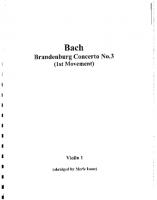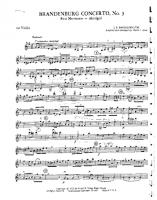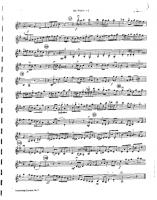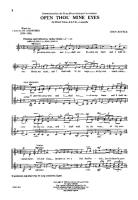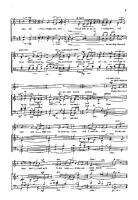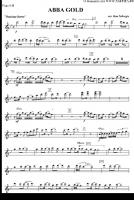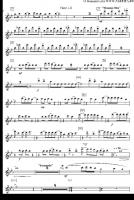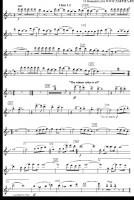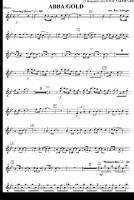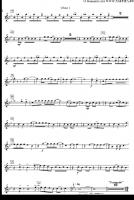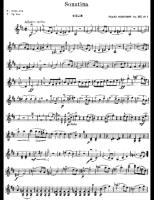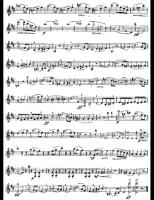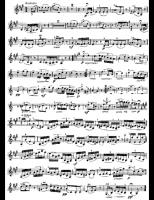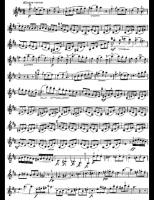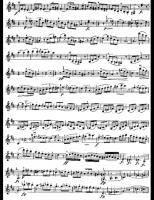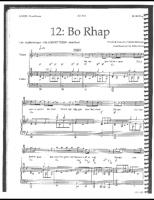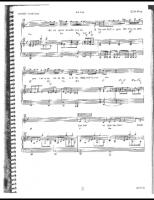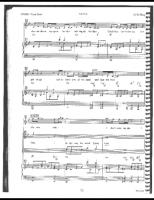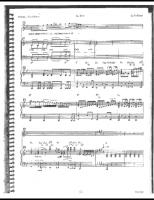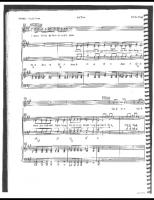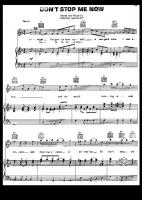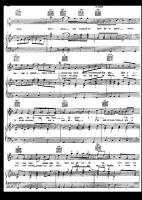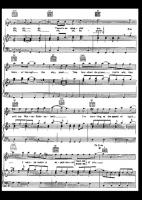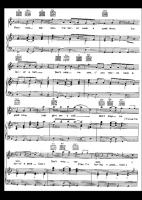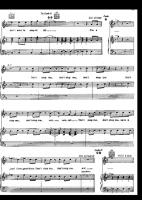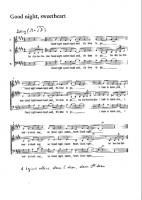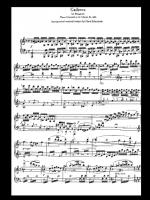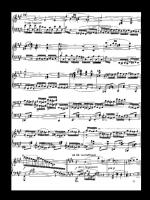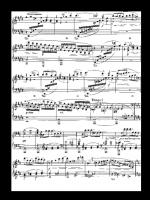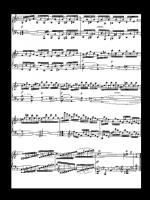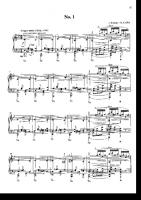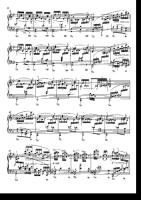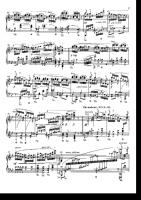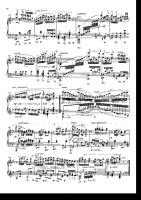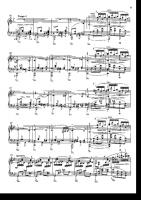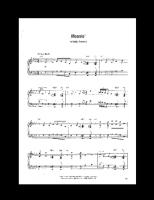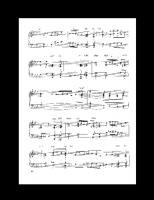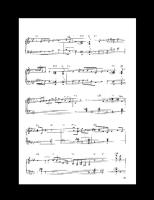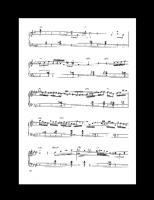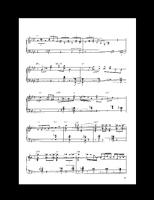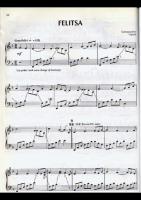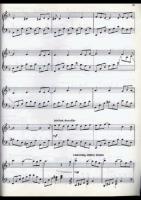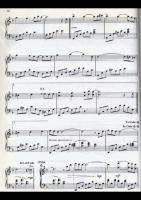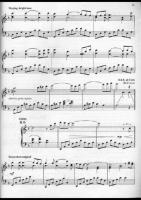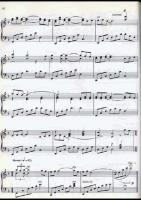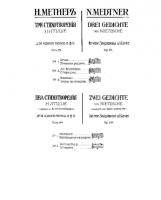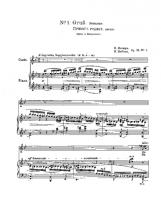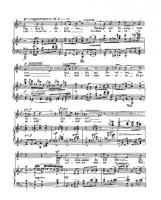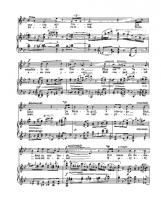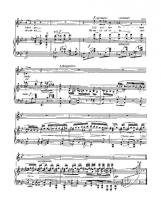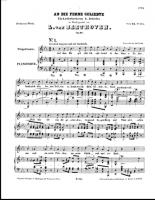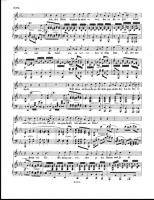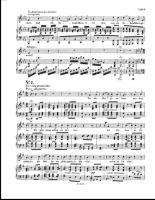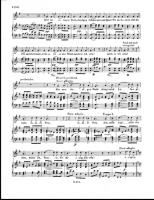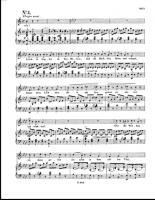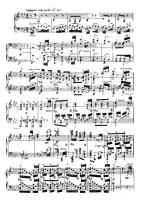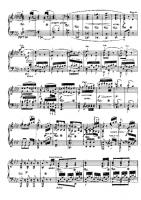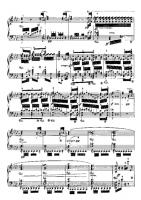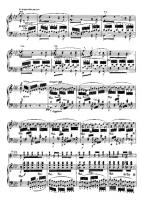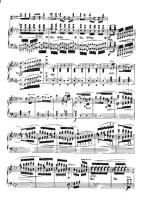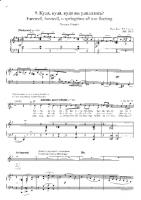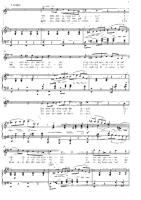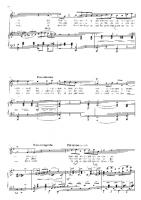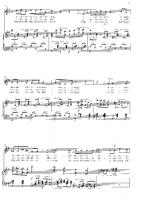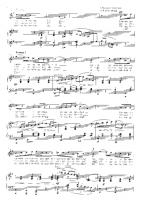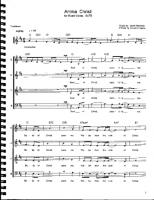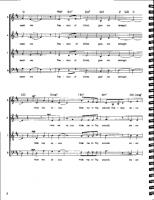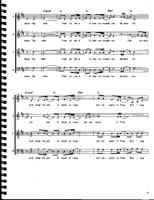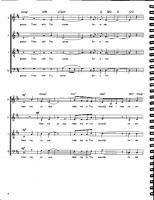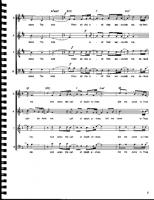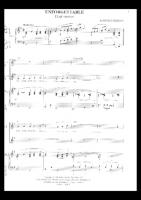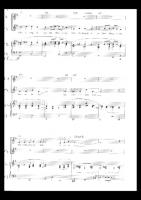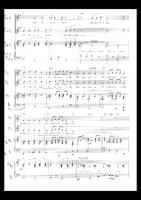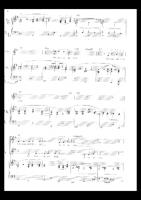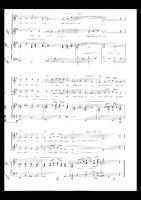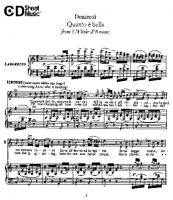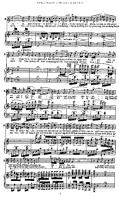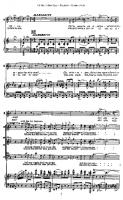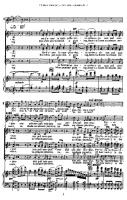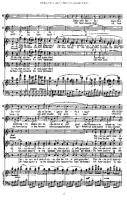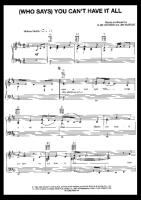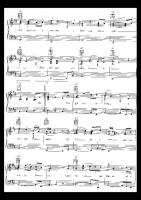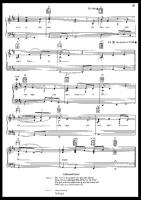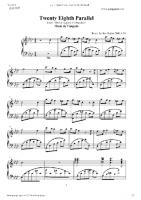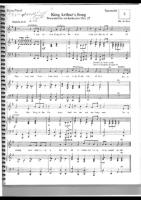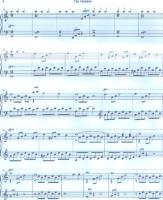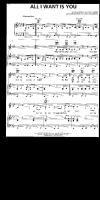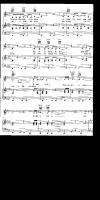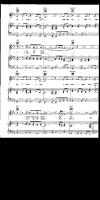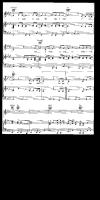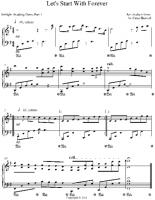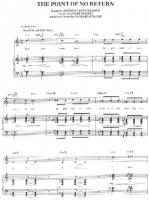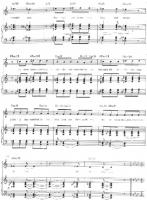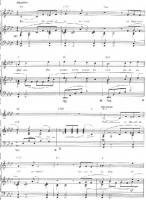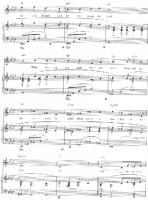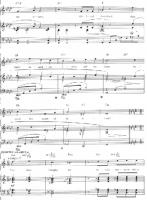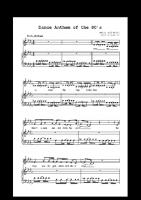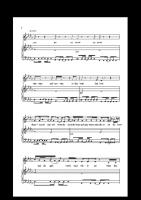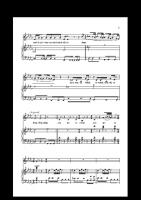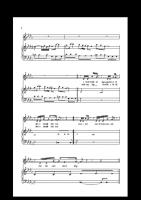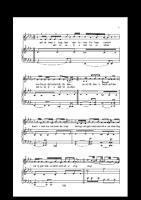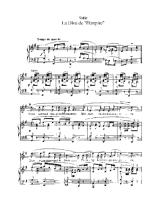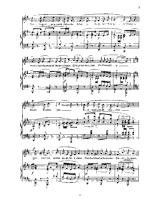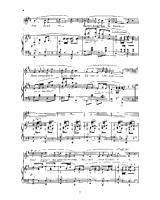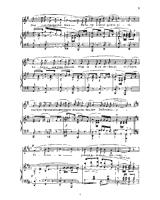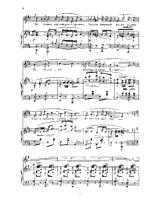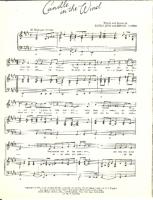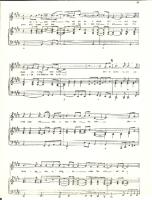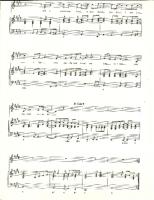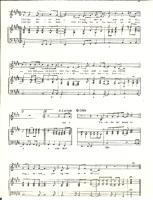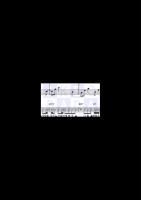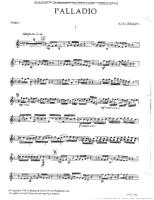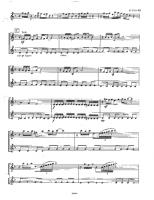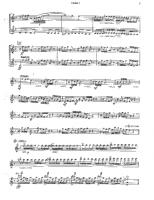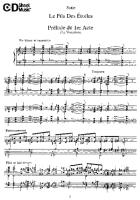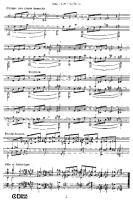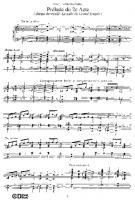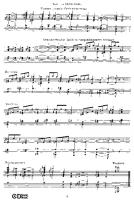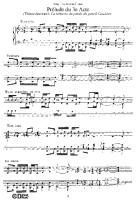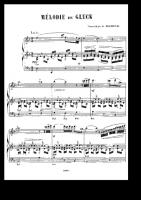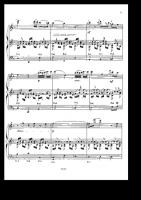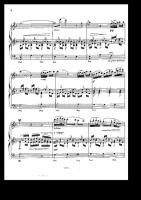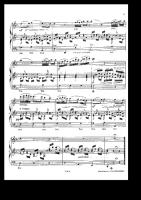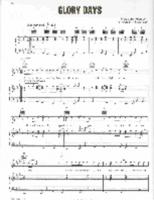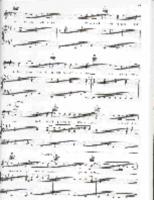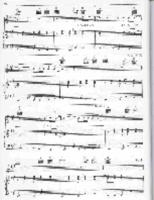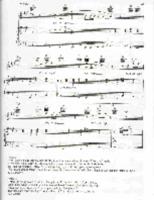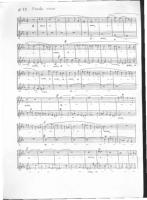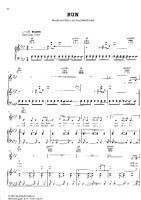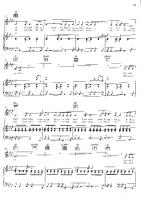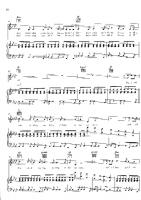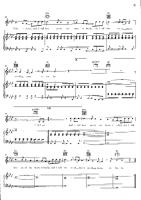Latest Sheets
Bach
Johann Sebastian Bach (31 March 1685 – 28 July 1750) was a German composer and organist whose sacred and secular works for choir, orchestra, and solo instruments drew together the strands of the Baroque period and brought it to its ultimate maturity. Although he introduced no new forms, he enriched the prevailing German style with a robust contrapuntal technique, an unrivalled control of harmonic and motivic organisation in composition for diverse musical forces, and the adaptation of rhythms and textures from abroad, particularly Italy and France.
Revered for their intellectual depth and technical and artistic beauty, Bach's works include the Brandenburg concertos; the Goldberg Variations; the English Suites, French Suites, Partitas, and Well-Tempered Clavier; the Mass in B Minor; the St. Matthew Passion; the St. John Passion; The Musical Offering; The Art of Fugue; the Sonatas and Partitas for violin solo; the Cello Suites; more than 200 surviving cantatas; and a similar number of organ works, including the celebrated Toccata and Fugue in D Minor.
While Bach's fame as an organist was great during his lifetime, he was not particularly well-known as a composer. His adherence to Baroque forms and contrapuntal style was considered "old-fashioned" by his contemporaries, especially late in his career when the musical fashion tended towards Rococo and later Classical styles. A revival of interest and performances of his music began early in the 19th century, and he is now widely considered to be one of the greatest composers in the Western tradition.
Revered for their intellectual depth and technical and artistic beauty, Bach's works include the Brandenburg concertos; the Goldberg Variations; the English Suites, French Suites, Partitas, and Well-Tempered Clavier; the Mass in B Minor; the St. Matthew Passion; the St. John Passion; The Musical Offering; The Art of Fugue; the Sonatas and Partitas for violin solo; the Cello Suites; more than 200 surviving cantatas; and a similar number of organ works, including the celebrated Toccata and Fugue in D Minor.
While Bach's fame as an organist was great during his lifetime, he was not particularly well-known as a composer. His adherence to Baroque forms and contrapuntal style was considered "old-fashioned" by his contemporaries, especially late in his career when the musical fashion tended towards Rococo and later Classical styles. A revival of interest and performances of his music began early in the 19th century, and he is now widely considered to be one of the greatest composers in the Western tradition.
John Rutter
John Milford Rutter CBE (born 24 September 1945) is a British composer, conductor, editor, arranger and record producer, mainly of choral music.
Wolfgang A. Mozart
Wolfgang Amadeus Mozart (27 January 1756 – 5 December 1791), baptised as Johannes Chrysostomus Wolfgangus Theophilus Mozart, was a prolific and influential composer of the classical era.
Born in Salzburg, Mozart showed prodigious ability from his earliest childhood. Already competent on keyboard and violin, he composed from the age of five and performed before European royalty. At 17, Mozart was engaged as a musician at the Salzburg court but grew restless and travelled in search of a better position. While visiting Vienna in 1781, he was dismissed from his Salzburg position. He chose to stay in the capital, where he achieved fame but little financial security. During his final years in Vienna, he composed many of his best-known symphonies, concertos, and operas, and portions of the Requiem, which was largely unfinished at the time of his early death at the age of 35. The circumstances of his death have been much mythologized
Born in Salzburg, Mozart showed prodigious ability from his earliest childhood. Already competent on keyboard and violin, he composed from the age of five and performed before European royalty. At 17, Mozart was engaged as a musician at the Salzburg court but grew restless and travelled in search of a better position. While visiting Vienna in 1781, he was dismissed from his Salzburg position. He chose to stay in the capital, where he achieved fame but little financial security. During his final years in Vienna, he composed many of his best-known symphonies, concertos, and operas, and portions of the Requiem, which was largely unfinished at the time of his early death at the age of 35. The circumstances of his death have been much mythologized
ABBA
ABBA was a Swedish Eurovision Song Contest-winning pop music group active between 1972 and 1982. Benny Andersson, Björn Ulvaeus, Anni-Frid Lyngstad (Frida), Agnetha Fältskog are in ABBA. They topped the charts worldwide from the mid-1970s to the early 1980s. The name "ABBA" is an acronym formed from the first letters of each of the group member's given name (Agnetha, Björn, Benny, Anni-Frid).
ABBA gained immense international popularity employing catchy song hooks, simple lyrics, and a Wall of Sound achieved by overdubbing the female singers' voices in multiple harmonies. As their popularity grew, they were sought-after to tour Europe, Australia, and North America, drawing crowds of near-hysterical fans ("ABBAholics"), notably in Australia. Touring became a contentious issue, being particularly unpopular with Agnetha, but they continued to release studio albums to great commercial success. At the height of their popularity, however, both marriages of the band members (Benny with Frida, and Björn with Agnetha) failed, and the relationship changes were reflected in their music, as they produced more thoughtful lyrics with different compositions.
They remain a fixture of radio playlists and are one of the world's best selling bands, having sold around 400 million records world wide; The music of ABBA has been re-arranged into the successful musical Mamma Mia! that has toured worldwide and a movie version was released in July 2008. All four of the former members of ABBA were present at the Stockholm premieres of both the musical (2005) and the film (2008). The film première took place at the Benny Andersson-owned Rival theatre at Mariatorget, Stockholm on 4 July 2008.
ABBA gained immense international popularity employing catchy song hooks, simple lyrics, and a Wall of Sound achieved by overdubbing the female singers' voices in multiple harmonies. As their popularity grew, they were sought-after to tour Europe, Australia, and North America, drawing crowds of near-hysterical fans ("ABBAholics"), notably in Australia. Touring became a contentious issue, being particularly unpopular with Agnetha, but they continued to release studio albums to great commercial success. At the height of their popularity, however, both marriages of the band members (Benny with Frida, and Björn with Agnetha) failed, and the relationship changes were reflected in their music, as they produced more thoughtful lyrics with different compositions.
They remain a fixture of radio playlists and are one of the world's best selling bands, having sold around 400 million records world wide; The music of ABBA has been re-arranged into the successful musical Mamma Mia! that has toured worldwide and a movie version was released in July 2008. All four of the former members of ABBA were present at the Stockholm premieres of both the musical (2005) and the film (2008). The film première took place at the Benny Andersson-owned Rival theatre at Mariatorget, Stockholm on 4 July 2008.
Franz Schubert
Franz Peter Schubert (German pronunciation: ; January 31, 1797 – November 19, 1828) was an Austrian composer. He wrote some 600 Lieder, nine symphonies (including the famous "Unfinished Symphony"), liturgical music, operas, some incidental music, and a large body of chamber and solo piano music. He is particularly noted for his original melodic and harmonic writing.
Schubert was born into a musical family, and received formal musical training through much of his childhood. While Schubert had a close circle of friends and associates who admired his work (amongst them the prominent singer Johann Michael Vogl), wide appreciation of his music during his lifetime was limited at best. He was never able to secure adequate permanent employment, and for most of his career he relied on the support of friends and family. He made some money from published works, and occasionally gave private musical instruction. In the last year of his life he began to receive wider acclaim. He died at the age of 31 of "typhoid fever", a diagnosis which was vague at the time; several scholars suspect the real illness was tertiary syphilis.
Interest in Schubert's work increased dramatically in the decades following his death. Composers like Franz Liszt, Robert Schumann and Felix Mendelssohn discovered, collected, and championed his works in the 19th century, as did musicologist Sir George Grove. Franz Schubert is now widely considered to be one of the greatest composers in the Western tradition.
Schubert was born into a musical family, and received formal musical training through much of his childhood. While Schubert had a close circle of friends and associates who admired his work (amongst them the prominent singer Johann Michael Vogl), wide appreciation of his music during his lifetime was limited at best. He was never able to secure adequate permanent employment, and for most of his career he relied on the support of friends and family. He made some money from published works, and occasionally gave private musical instruction. In the last year of his life he began to receive wider acclaim. He died at the age of 31 of "typhoid fever", a diagnosis which was vague at the time; several scholars suspect the real illness was tertiary syphilis.
Interest in Schubert's work increased dramatically in the decades following his death. Composers like Franz Liszt, Robert Schumann and Felix Mendelssohn discovered, collected, and championed his works in the 19th century, as did musicologist Sir George Grove. Franz Schubert is now widely considered to be one of the greatest composers in the Western tradition.
Queen
Queen were an English rock band formed in 1970 in London by guitarist Brian May, lead vocalist Freddie Mercury, and drummer Roger Taylor, with bass guitarist John Deacon completing the lineup the following year. While it is uncertain how many albums the band has sold, estimations range from 130 million to over 300 million albums worldwide.
The band is noted for their musical diversity, multi-layered arrangements, vocal harmonies, and incorporation of audience participation into their live performances. Their 1985 Live Aid performance was voted the best live rock performance of all time in an industry poll.
Queen had moderate success in the early 1970s, with the albums Queen and Queen II, but it was with the release of Sheer Heart Attack in 1974 and A Night at the Opera the following year that the band gained international success. They have released fifteen studio albums, five live albums, and numerous compilation albums. Eighteen of these have reached number one on charts around the world.
Following Mercury's death in 1991 and Deacon's retirement later in the decade, May and Taylor have performed infrequently under the Queen name. Since 2005 they have been collaborating with Paul Rodgers, under the moniker Queen + Paul Rodgers.
The band is noted for their musical diversity, multi-layered arrangements, vocal harmonies, and incorporation of audience participation into their live performances. Their 1985 Live Aid performance was voted the best live rock performance of all time in an industry poll.
Queen had moderate success in the early 1970s, with the albums Queen and Queen II, but it was with the release of Sheer Heart Attack in 1974 and A Night at the Opera the following year that the band gained international success. They have released fifteen studio albums, five live albums, and numerous compilation albums. Eighteen of these have reached number one on charts around the world.
Following Mercury's death in 1991 and Deacon's retirement later in the decade, May and Taylor have performed infrequently under the Queen name. Since 2005 they have been collaborating with Paul Rodgers, under the moniker Queen + Paul Rodgers.
Traditional
traditional music
Scott Joplin
Scott Joplin (between June 1867 and January 1868 – April 1, 1917) was an American musician and composer of ragtime music. He remains the best-known ragtime figure and is regarded as one of the three most important composers of classic ragtime, along with James Scott and Joseph Lamb, and also a precursor to Stride Piano. Decades after his death, his music enjoyed a considerable surge of popularity and critical respect in the 1970s, especially for his most famous composition, "The Entertainer."
Even at the time of publication, Joplin's publisher John Stark was claiming that the rags had obtained classical status, and "lifted ragtime from its low estate and lined it up with Beethoven and Bach".
Even at the time of publication, Joplin's publisher John Stark was claiming that the rags had obtained classical status, and "lifted ragtime from its low estate and lined it up with Beethoven and Bach".
Brahms
Johannes Brahms (May 7, 1833 â April 3, 1897) was a German composer of the Romantic period. He was born in Hamburg and in his later years he settled in Vienna, Austria.
Brahms maintained a Classical sense of form and order in his works â in contrast to the opulence of the music of many of his contemporaries. Thus many admirers (though not necessarily Brahms himself) saw him as the champion of traditional forms and "pure music," as opposed to the New German embrace of program music.
Brahms venerated Beethoven: in the composer's home, a marble bust of Beethoven looked down on the spot where he composed, and some passages in his works are reminiscent of Beethoven's style. The main theme of the finale of Brahms's First Symphony is reminiscent of the main theme of the finale of Beethoven's Ninth, and when this resemblance was pointed out to Brahms he replied that any ass â jeder Esel â could see that.
Ein deutsches Requiem was partially inspired by his mother's death in 1865, but also incorporates material from a Symphony he started in 1854, but abandoned following Schumann's suicide attempt. He once wrote that the Requiem "belonged to Schumann". The first movement of this abandoned Symphony was re-worked as the first movement of the First Piano Concerto.
Brahms also loved the Classical composers Mozart and Haydn. He collected first editions and autographs of their works, and edited performing editions. He also studied the music of pre-classical composers, including Giovanni Gabrieli, Johann Adolph Hasse, Heinrich Schütz and especially Johann Sebastian Bach. His friends included leading musicologists, and with Friedrich Chrysander he edited an edition of the works of François Couperin. He looked to older music for inspiration in the arts of strict counterpoint; the themes of some of his works are modelled on Baroque sources, such as Bach's The Art of Fugue in the fugal finale of Cello Sonata No. 1, or the same composer's Cantata No. 150 in the passacaglia theme of the Fourth Symphony's finale.
Brahms maintained a Classical sense of form and order in his works â in contrast to the opulence of the music of many of his contemporaries. Thus many admirers (though not necessarily Brahms himself) saw him as the champion of traditional forms and "pure music," as opposed to the New German embrace of program music.
Brahms venerated Beethoven: in the composer's home, a marble bust of Beethoven looked down on the spot where he composed, and some passages in his works are reminiscent of Beethoven's style. The main theme of the finale of Brahms's First Symphony is reminiscent of the main theme of the finale of Beethoven's Ninth, and when this resemblance was pointed out to Brahms he replied that any ass â jeder Esel â could see that.
Ein deutsches Requiem was partially inspired by his mother's death in 1865, but also incorporates material from a Symphony he started in 1854, but abandoned following Schumann's suicide attempt. He once wrote that the Requiem "belonged to Schumann". The first movement of this abandoned Symphony was re-worked as the first movement of the First Piano Concerto.
Brahms also loved the Classical composers Mozart and Haydn. He collected first editions and autographs of their works, and edited performing editions. He also studied the music of pre-classical composers, including Giovanni Gabrieli, Johann Adolph Hasse, Heinrich Schütz and especially Johann Sebastian Bach. His friends included leading musicologists, and with Friedrich Chrysander he edited an edition of the works of François Couperin. He looked to older music for inspiration in the arts of strict counterpoint; the themes of some of his works are modelled on Baroque sources, such as Bach's The Art of Fugue in the fugal finale of Cello Sonata No. 1, or the same composer's Cantata No. 150 in the passacaglia theme of the Fourth Symphony's finale.
Vivaldi
Antonio Lucio Vivaldi (March 4, 1678 â July 28, 1741), nicknamed il Prete Rosso ("The Red Priest"), was a Venetian priest and Baroque music composer, as well as a famous virtuoso violinist; he was born and raised in the Republic of Venice. The Four Seasons, a series of four violin concerti, is his best-known work and a highly popular Baroque piece.
Many of Vivaldi's compositions reflect a flamboyant, almost playful, exuberance. Most of Vivaldi's repertoire was rediscovered only in the first half of the 20th century in Turin and Genoa and was published in the second half. Vivaldi's music is innovative, breaking a consolidated tradition in schemes; he gave brightness to the formal and the rhythmic structure of the concerto, repeatedly looking for harmonic contrasts and innovative melodies and themes. Moreover, Vivaldi was able to compose nonacademic music, particularly meant to be appreciated by the wide public and not only by an intellectual minority. The joyful appearance of his music reveals in this regard a transmissible joy of composing; these are among the causes of the vast popularity of his music. This popularity soon made him famous in other countries such as France which was, at the time, very independent concerning its musical taste.
Vivaldi is considered one of the composers who brought Baroque music (with its typical contrast among heavy sonorities) to evolve into a classical style. Johann Sebastian Bach was deeply influenced by Vivaldi's concertos and arias (recalled in his Johannes Passion, Matthäuspassion, and cantatas). Bach transcribed a number of Vivaldi's concerti for solo keyboard, along with a number for orchestra, including the famous Concerto for Four Violins and Violoncello, Strings and Continuo (RV 580).
Many of Vivaldi's compositions reflect a flamboyant, almost playful, exuberance. Most of Vivaldi's repertoire was rediscovered only in the first half of the 20th century in Turin and Genoa and was published in the second half. Vivaldi's music is innovative, breaking a consolidated tradition in schemes; he gave brightness to the formal and the rhythmic structure of the concerto, repeatedly looking for harmonic contrasts and innovative melodies and themes. Moreover, Vivaldi was able to compose nonacademic music, particularly meant to be appreciated by the wide public and not only by an intellectual minority. The joyful appearance of his music reveals in this regard a transmissible joy of composing; these are among the causes of the vast popularity of his music. This popularity soon made him famous in other countries such as France which was, at the time, very independent concerning its musical taste.
Vivaldi is considered one of the composers who brought Baroque music (with its typical contrast among heavy sonorities) to evolve into a classical style. Johann Sebastian Bach was deeply influenced by Vivaldi's concertos and arias (recalled in his Johannes Passion, Matthäuspassion, and cantatas). Bach transcribed a number of Vivaldi's concerti for solo keyboard, along with a number for orchestra, including the famous Concerto for Four Violins and Violoncello, Strings and Continuo (RV 580).
Nickelback
Nickelback is a Canadian post-grunge band formed in Hanna, Alberta by Chad Kroeger, Mike Kroeger, Ryan Peake and then-drummer Brandon Kroeger (the current drummer of Nickelback being Daniel Adair). The band is one of the most popular of the modern post-grunge genre, along with groups such as 3 Doors Down and Daughtry, performing in a significantly more radio-friendly style than the traditional, early 1990s grunge music era. Although the founders of the band hail from Hanna, Alberta, a small town east of Calgary, they are now based in Vancouver, British Columbia, Canada. The band's name originates from the nickel in change that band member Mike Kroeger gave customers at his Starbucks job—he would frequently say, "Here's your nickel back".
The band is signed to EMI at home and Roadrunner Records for the rest of the world. In July 2008, the band signed with Live Nation for three touring and album cycles, with an option for a fourth cycle. The contract includes recordings, touring, merchandise and other rights.
The band is signed to EMI at home and Roadrunner Records for the rest of the world. In July 2008, the band signed with Live Nation for three touring and album cycles, with an option for a fourth cycle. The contract includes recordings, touring, merchandise and other rights.
Bobby Timmons
Robert Henry Timmons was an American jazz pianist and composer. He was a sideman in Art Blakey's Jazz Messengers for two periods, between which he was part of Cannonball Adderley's band.
Yanni
Yanni (born Yiannis Hrysomallis (pronounced Chrysomallis), (Greek: Γιάννης Χρυσομάλλης, classical transcription Giannis Chrysomallis), on November 14, 1954 in Kalamata, Greece) is a self-taught pianist, keyboardist, and composer. After receiving a B.A. in psychology, he would instead seek a life in music though he had no formal training and could not read a note.
He earned Grammy nominations for his 1992 album, Dare to Dream, and the 1993 follow-up, In My Time. His breakthrough success came with the 1994 release of Yanni Live at the Acropolis, deemed to be the second best-selling music video of all time, (behind Michael Jackson's video for Thriller with nine million units). Yanni has since performed live in concert before in excess of two million people in more than 20 countries around the world. He has accumulated more than 35 platinum and gold albums globally, with sales totaling over 20 million copies. Yanni is considered to be one of the top fundraisers of all time for public television. His compositions have been included in all Olympic Games television broadcasts since 1988, and his music has been used extensively in television and televised sporting events. His music is frequently described as "new age", though he prefers the term "contemporary instrumental". The regents of the University of Minnesota conferred upon Yanni the honorary degree of Doctor of Humane Letters.
He earned Grammy nominations for his 1992 album, Dare to Dream, and the 1993 follow-up, In My Time. His breakthrough success came with the 1994 release of Yanni Live at the Acropolis, deemed to be the second best-selling music video of all time, (behind Michael Jackson's video for Thriller with nine million units). Yanni has since performed live in concert before in excess of two million people in more than 20 countries around the world. He has accumulated more than 35 platinum and gold albums globally, with sales totaling over 20 million copies. Yanni is considered to be one of the top fundraisers of all time for public television. His compositions have been included in all Olympic Games television broadcasts since 1988, and his music has been used extensively in television and televised sporting events. His music is frequently described as "new age", though he prefers the term "contemporary instrumental". The regents of the University of Minnesota conferred upon Yanni the honorary degree of Doctor of Humane Letters.
Coldplay
Coldplay are a rock band formed in London, England in 1997. The group comprises vocalist/pianist/guitarist Chris Martin, lead guitarist Jonny Buckland, bassist Guy Berryman, and drummer/multi-instrumentalist Will Champion. Coldplay have sold 34.6 million albums, and are also known for their hit singles, such as "Yellow", "The Scientist", "Speed of Sound", "Fix You", "Viva la Vida" and the Grammy Award-winning "Clocks".
Coldplay achieved worldwide fame with the release of their single "Yellow", followed by their debut album, Parachutes (2000), which was nominated for the Mercury Prize. Its follow-up, A Rush of Blood to the Head (2002) won multiple awards such as NME's Album of the Year and was later included on Rolling Stone magazine's 500 Greatest Albums of All Time list, ranking at #473. Their next release, X&Y (2005), received a slightly less enthusiastic yet still generally positive reception. The band's fourth studio album, Viva la Vida or Death and All His Friends (2008), was produced by Brian Eno and released again to largely favourable reviews. All of Coldplay's albums have enjoyed great commercial success.
Coldplay's early material was compared to acts such as Jeff Buckley, U2, and Travis. Coldplay have been an active supporter of various social and political causes, such as Oxfam's Make Trade Fair campaign and Amnesty International. The group have also performed at various charity projects such as Band Aid 20, Live 8, and the Teenage Cancer Trust.
Coldplay achieved worldwide fame with the release of their single "Yellow", followed by their debut album, Parachutes (2000), which was nominated for the Mercury Prize. Its follow-up, A Rush of Blood to the Head (2002) won multiple awards such as NME's Album of the Year and was later included on Rolling Stone magazine's 500 Greatest Albums of All Time list, ranking at #473. Their next release, X&Y (2005), received a slightly less enthusiastic yet still generally positive reception. The band's fourth studio album, Viva la Vida or Death and All His Friends (2008), was produced by Brian Eno and released again to largely favourable reviews. All of Coldplay's albums have enjoyed great commercial success.
Coldplay's early material was compared to acts such as Jeff Buckley, U2, and Travis. Coldplay have been an active supporter of various social and political causes, such as Oxfam's Make Trade Fair campaign and Amnesty International. The group have also performed at various charity projects such as Band Aid 20, Live 8, and the Teenage Cancer Trust.
Nikolai Medtner
Nikolai Karlovich Medtner was a Russian composer and pianist. After a period of comparative obscurity in the twenty-five years immediately after his death, he is now becoming recognized as one of the most significant Russian composers for the piano.
Beethoven
Ludwig van Beethoven (16 December 1770 - 26 March 1827) was a German composer and pianist. He was a crucial figure in the transitional period between the Classical and Romantic eras in Western classical music, and remains one of the most respected and influential composers of all time.
Born in Bonn, then in the Electorate of Cologne (now in modern-day Germany), he moved to Vienna in his early twenties and settled there, studying with Joseph Haydn and quickly gaining a reputation as a virtuoso pianist. Beethoven's hearing gradually deteriorated beginning in his twenties, yet he continued to compose masterpieces, and to conduct and perform, even after he was completely deaf.
Born in Bonn, then in the Electorate of Cologne (now in modern-day Germany), he moved to Vienna in his early twenties and settled there, studying with Joseph Haydn and quickly gaining a reputation as a virtuoso pianist. Beethoven's hearing gradually deteriorated beginning in his twenties, yet he continued to compose masterpieces, and to conduct and perform, even after he was completely deaf.
ZUN
ZUN" and is the main programmer, scriptwriter, graphic artist, and music composer. His real name is Jun'ya Ōta
Andrew Lloyd Webber
Andrew Lloyd Webber, Baron Lloyd-Webber (born 22 March 1948) is an English composer of musical theatre, the elder son of organist William Lloyd Webber and brother of the cellist Julian Lloyd Webber. Lloyd Webber started composing at the age of six, and published his first piece at the age of nine.
Lloyd Webber has achieved great popular success, with several musicals that have run for more than a decade both in the West End and on Broadway. He has composed 13 musicals, a song cycle, a set of variations, two film scores, and a Latin Requiem Mass. He has also gained a number of honours, including a knighthood in 1992, followed by a peerage from the British Government for services to Music, seven Tony Awards (and 40 nominations), three Grammy Awards (with an additional 60 nominations), an Academy Award (two other nominations), seven Olivier Awards (with 100 nominations), a Golden Globe, and the Kennedy Center Honors in 2006. Several of his songs, notably "The Music of the Night" from The Phantom of the Opera, "I Don't Know How to Love Him" from Jesus Christ Superstar, "Don't Cry for Me, Argentina" from Evita, "Any Dream Will Do" from Joseph and the Amazing Technicolor Dreamcoat and "Memory" from Cats have been widely recorded and were hits outside of their parent musicals. His company, the Really Useful Group, is one of the largest theatre operators in London.
Producers in several parts of the UK have staged productions, including national tours, of Lloyd Webber's musicals under licence from the Really Useful Group. According to britishhitsongwriters.com, he is the one hundredth most successful songwriter in U.K. singles chart history, based on weeks that his compositions have spent on the chart.
Lloyd Webber has achieved great popular success, with several musicals that have run for more than a decade both in the West End and on Broadway. He has composed 13 musicals, a song cycle, a set of variations, two film scores, and a Latin Requiem Mass. He has also gained a number of honours, including a knighthood in 1992, followed by a peerage from the British Government for services to Music, seven Tony Awards (and 40 nominations), three Grammy Awards (with an additional 60 nominations), an Academy Award (two other nominations), seven Olivier Awards (with 100 nominations), a Golden Globe, and the Kennedy Center Honors in 2006. Several of his songs, notably "The Music of the Night" from The Phantom of the Opera, "I Don't Know How to Love Him" from Jesus Christ Superstar, "Don't Cry for Me, Argentina" from Evita, "Any Dream Will Do" from Joseph and the Amazing Technicolor Dreamcoat and "Memory" from Cats have been widely recorded and were hits outside of their parent musicals. His company, the Really Useful Group, is one of the largest theatre operators in London.
Producers in several parts of the UK have staged productions, including national tours, of Lloyd Webber's musicals under licence from the Really Useful Group. According to britishhitsongwriters.com, he is the one hundredth most successful songwriter in U.K. singles chart history, based on weeks that his compositions have spent on the chart.
Bukas Palad
The Bukas Palad Music Ministry (Filipino for "generous"; literally, "open palm") is a Roman Catholic, contemporary worship musical group in the Philippines that composes, records, and performs original religious music. Since 1986, Bukas Palad has recorded over a dozen albums with the Jesuit Music Ministry of Jesuit Communications Foundation, a ministry of the Philippine Province of the Society of Jesus, based in Ateneo de Manila University. The group has performed in over a hundred solo concerts across the country and overseas in Japan, Hong Kong, the United States, and Canada.
Nat King Cole
Nathaniel Adams Coles (March 17, 1919 â February 15, 1965), known professionally as Nat King Cole, was an American musician.
Cole first came to prominence as a leading jazz pianist, then switched his emphasis to singing, becoming one of the most popular and best known vocalists of all time.
Cole's first mainstream vocal hit was his 1943 recording of one of his compositions, "Straighten Up and Fly Right", based on a black folk tale that his father had used as a theme for a sermon. Johnny Mercer invited him to record it for the fledgling Capitol Records label. It sold over 500,000 copies, and proved that folk-based material could appeal to a wide audience. Although Nat would never be considered a rocker, the song can be seen as anticipating the first rock and roll records. Indeed, Bo Diddley, who performed similar transformations of folk material, counted Cole as an influence.
Beginning in the late 1940s, Cole began recording and performing more pop-oriented material for mainstream audiences, often accompanied by a string orchestra. His stature as a popular icon was cemented during this period by hits such as "The Christmas Song" (Cole recorded the tune four times: June 14, 1946 as a pure Trio recording; August 19, 1946 with an added string section; August 24, 1953; and again in 1961 for the double album, The Nat King Cole Story. This final version, recorded in stereo, is the one most often heard today.), "Nature Boy" (1948), "Mona Lisa" (1950), "Too Young" (the #1 song in 1951), and his signature tune "Unforgettable" (1951). While this shift to pop music led some jazz critics and fans to accuse Cole of selling out, he never totally abandoned his jazz roots; as late as 1956, for instance, he recorded an all-jazz album, After Midnight.
His last album, L-O-V-E, was recorded in early December 1964 â just a few days before entering the hospital for lung cancer treatment â and released just prior to his death; it peaked at #4 on the Billboard Albums chart in the spring of 1965. A Best Of album went gold in 1968. His 1957 recording of "When I Fall In Love" reached #4 in the UK charts in 1987.
Cole first came to prominence as a leading jazz pianist, then switched his emphasis to singing, becoming one of the most popular and best known vocalists of all time.
Cole's first mainstream vocal hit was his 1943 recording of one of his compositions, "Straighten Up and Fly Right", based on a black folk tale that his father had used as a theme for a sermon. Johnny Mercer invited him to record it for the fledgling Capitol Records label. It sold over 500,000 copies, and proved that folk-based material could appeal to a wide audience. Although Nat would never be considered a rocker, the song can be seen as anticipating the first rock and roll records. Indeed, Bo Diddley, who performed similar transformations of folk material, counted Cole as an influence.
Beginning in the late 1940s, Cole began recording and performing more pop-oriented material for mainstream audiences, often accompanied by a string orchestra. His stature as a popular icon was cemented during this period by hits such as "The Christmas Song" (Cole recorded the tune four times: June 14, 1946 as a pure Trio recording; August 19, 1946 with an added string section; August 24, 1953; and again in 1961 for the double album, The Nat King Cole Story. This final version, recorded in stereo, is the one most often heard today.), "Nature Boy" (1948), "Mona Lisa" (1950), "Too Young" (the #1 song in 1951), and his signature tune "Unforgettable" (1951). While this shift to pop music led some jazz critics and fans to accuse Cole of selling out, he never totally abandoned his jazz roots; as late as 1956, for instance, he recorded an all-jazz album, After Midnight.
His last album, L-O-V-E, was recorded in early December 1964 â just a few days before entering the hospital for lung cancer treatment â and released just prior to his death; it peaked at #4 on the Billboard Albums chart in the spring of 1965. A Best Of album went gold in 1968. His 1957 recording of "When I Fall In Love" reached #4 in the UK charts in 1987.
Gaetano Donizetti
Domenico Gaetano Maria Donizetti is an Italian opera composer. His most famous composition was Lucia di Lammermoor, which he composed in 1835. Date of birth: November 29, 1797, Bergamo, Italy Date and place of death: April 8, 1848, Bergamo, Italy Full name: Gaetano Domenico Maria Donizetti
Alan Jackson
Alan Eugene Jackson (born 17 October 1958 in Newnan, Georgia) is an American country singer-songwriter who has sold over 50 million records. He was influenced by the new traditional country of the 1980s, and he was one of the most popular country singers of the 1990s, blending both honky tonk and mainstream country sounds and penning many of his own hits. His success continued into the 2000s and his music became increasingly counterposed with that of more mainstream country acts that were moving toward a more pop music sound. He is the recipient and nominee of multiple awards. He was inducted into the Georgia Music Hall of Fame in 2001.
Chopin
Frédéric Chopin (1 March 1810 – 17 October 1849) was a Polish composer and virtuoso pianist of the Romantic period. He is widely regarded as the greatest Polish composer, and ranks as one of music's greatest tone poets.
He was born in the village of Żelazowa Wola, in the Duchy of Warsaw, to a Polish mother and French-expatriate father, and in his early life was regarded as a child-prodigy pianist. In November 1830, at the age of 20, Chopin went abroad; following the suppression of the Polish November Uprising of 1830–31, he became one of many expatriates of the Polish "Great Emigration."
In Paris, he made a comfortable living as a composer and piano teacher, while giving few public performances. A Polish patriot,
Chopin's extant compositions were written primarily for the piano as a solo instrument. Though technically demanding, Chopin's style emphasizes nuance and expressive depth rather than virtuosity. Chopin invented musical forms such as the ballade and was responsible for major innovations in forms such as the piano sonata, waltz, nocturne, étude, impromptu and prelude. His works are mainstays of Romanticism in 19th-century classical music.
He was born in the village of Żelazowa Wola, in the Duchy of Warsaw, to a Polish mother and French-expatriate father, and in his early life was regarded as a child-prodigy pianist. In November 1830, at the age of 20, Chopin went abroad; following the suppression of the Polish November Uprising of 1830–31, he became one of many expatriates of the Polish "Great Emigration."
In Paris, he made a comfortable living as a composer and piano teacher, while giving few public performances. A Polish patriot,
Chopin's extant compositions were written primarily for the piano as a solo instrument. Though technically demanding, Chopin's style emphasizes nuance and expressive depth rather than virtuosity. Chopin invented musical forms such as the ballade and was responsible for major innovations in forms such as the piano sonata, waltz, nocturne, étude, impromptu and prelude. His works are mainstays of Romanticism in 19th-century classical music.
Vangelis
Evangelos Odysseas Papathanassiou (Greek: Ευάγγελος Οδυσσέας Παπαθανασίου ; born 29 March 1943), known professionally as Vangelis (Greek: Βαγγέλης ; English pronunciation: /væŋˈɡɛlᵻs/), is a Greek composer of electronic, progressive, ambient, jazz, pop rock, and orchestral music. He is best known for his Academy Award–winning score for the film Chariots of Fire, composing scores for the films Antarctica, Blade Runner, Missing, 1492: Conquest of Paradise, and Alexander, and the use of his music in the PBS documentary Cosmos: A Personal Voyage by Carl Sagan.
After having taking piano lessons from renowned Greek composer Aristotelis Koundouroff, Vangelis began his professional musical career working with several popular bands of the 1960s such as The Forminx and Aphrodite's Child, with the latter's album 666 going on to be recognized as a psychedelic classic. Throughout the 1970s, Vangelis composed music scores for several animal documentaries, including L'Apocalypse Des Animaux, La Fête sauvage and Opéra sauvage; the success of these scores brought him into the film scoring mainstream. In the early 1980s, Vangelis formed a musical partnership with Jon Anderson, the lead singer of progressive rock band Yes, and the duo went on to release several albums together as Jon & Vangelis.
In 1981, he composed the score for the Oscar-winning film Chariots of Fire, for which he won an Academy Award for Best Original Music Score. The soundtrack's single, the film's "Titles" theme, also reached the top of the American Billboard Hot 100 chart and was used as the background music at the London 2012 Olympics winners' medal presentation ceremonies.
Having had a career in music spanning over 50 years and having composed and performed more than 52 albums, Vangelis is one of the most important proponents of electronic music.
After having taking piano lessons from renowned Greek composer Aristotelis Koundouroff, Vangelis began his professional musical career working with several popular bands of the 1960s such as The Forminx and Aphrodite's Child, with the latter's album 666 going on to be recognized as a psychedelic classic. Throughout the 1970s, Vangelis composed music scores for several animal documentaries, including L'Apocalypse Des Animaux, La Fête sauvage and Opéra sauvage; the success of these scores brought him into the film scoring mainstream. In the early 1980s, Vangelis formed a musical partnership with Jon Anderson, the lead singer of progressive rock band Yes, and the duo went on to release several albums together as Jon & Vangelis.
In 1981, he composed the score for the Oscar-winning film Chariots of Fire, for which he won an Academy Award for Best Original Music Score. The soundtrack's single, the film's "Titles" theme, also reached the top of the American Billboard Hot 100 chart and was used as the background music at the London 2012 Olympics winners' medal presentation ceremonies.
Having had a career in music spanning over 50 years and having composed and performed more than 52 albums, Vangelis is one of the most important proponents of electronic music.
spamelot
Monty Python's Spamalot is a musical comedy adapted from the 1975 film Monty Python and the Holy Grail. Like the motion picture, it is a highly irreverent parody of the Arthurian legend, but it differs from the film in many ways. The original 2005 Broadway production, directed by Mike Nichols, received 14 Tony Awards nominations, winning in three categories, including Best Musical. During its initial run of 1,575 performances, it was seen by more than two million people and grossed over $175 million. Tim Curry starred as King Arthur in the original Broadway and West End productions. It was one of eight UK musicals commemorated on Royal Mail stamps, issued in February 2011.
Alexandre Desplat
Desplat has extensively composed for films, first in France and later in Hollywood, including scores and incidental music for some 100 films among which are Lapse of Memory and Family Express (both 1992), Regarde Les Hommes Tomber (1994), Les Péchés Mortels (1995), the César nominated Un Héros Très Discret (1996), Une Minute De Silence and Sweet Revenge (both 1998), Le Château Des Singes (1999), Home Sweet Home and Reines D'Un Jour (both 2001), the César nominated Sur Mes Lèvres (2002), and Rire Et Châtiment (2003), among others.
Desplat has composed individual songs that have been sung in films by artists such as Akhenaton, Kate Beckinsale, Charlotte Gainsbourg, Valérie Lemercier, Miosotis, and Catherine Ringer. He has also written music for the theatre, including pieces performed at the Comédie Française. Desplat has conducted performances of his music played by the London Symphony Orchestra, the Royal Philharmonic Orchestra, and the Munich Symphony Orchestra. In addition to his composing and performing, Desplat has also given Master Classes at La Sorbonne in Paris and at London's Royal College of Music.
In 2007 he composed the high profile scores for Philip Pullman's The Golden Compass; Zach Helm's directorial debut Mr. Magorium's Wonder Emporium with American composer Aaron Zigman; and the Ang Lee movie Lust, Caution. Prior to these breakout works, he contributed scores for The Luzhin Defence, Girl with a Pearl Earring, Syriana, Birth, Hostage, Casanova, The Nest and The Painted Veil, for which he won the Golden Globe Award for Best Original Score, Los Angeles Film Critics Association Award for Best Music, and the 2006 World Soundtrack Award. He won the 2007 BMI Film Music Award, 2007 World Soundtrack Award, 2007 European Film Award, and received his first Academy Award nomination for Best Original Score for The Queen. He also won the Silver Berlin Bear at the Berlin Film Festival for Best Film Music in The Beat that My Heart Skipped. In 2008, Desplat received his second Oscar nomination for David Fincher's The Curious Case of Benjamin Button.
Desplat's recent projects include Largo Winch, based on the Belgian comic; Afterwards a French-Canadian psychological thriller film directed by Gilles Bourdos in English; Anne Fontaine's Coco avant Chanel based on the life of designer Coco Chanel; Robert Guédiguian's L'Armée du Crime; Cheri, reuniting him with director Stephen Frears, whom he collaborated with on The Queen; Un Prophète reuniting with director Jacques Audiard; Julie & Julia directed by Nora Ephron; Fantastic Mr. Fox, directed by Wes Anderson and based on the novel by Roald Dahl; and New Moon, directed by Chris Weitz, out in November 2009.
Desplat's upcoming projects are The Tree of Life, directed by Terrence Malick, The Ghost, directed by Roman Polanski, and Largo Winch 2 .
Desplat has composed individual songs that have been sung in films by artists such as Akhenaton, Kate Beckinsale, Charlotte Gainsbourg, Valérie Lemercier, Miosotis, and Catherine Ringer. He has also written music for the theatre, including pieces performed at the Comédie Française. Desplat has conducted performances of his music played by the London Symphony Orchestra, the Royal Philharmonic Orchestra, and the Munich Symphony Orchestra. In addition to his composing and performing, Desplat has also given Master Classes at La Sorbonne in Paris and at London's Royal College of Music.
In 2007 he composed the high profile scores for Philip Pullman's The Golden Compass; Zach Helm's directorial debut Mr. Magorium's Wonder Emporium with American composer Aaron Zigman; and the Ang Lee movie Lust, Caution. Prior to these breakout works, he contributed scores for The Luzhin Defence, Girl with a Pearl Earring, Syriana, Birth, Hostage, Casanova, The Nest and The Painted Veil, for which he won the Golden Globe Award for Best Original Score, Los Angeles Film Critics Association Award for Best Music, and the 2006 World Soundtrack Award. He won the 2007 BMI Film Music Award, 2007 World Soundtrack Award, 2007 European Film Award, and received his first Academy Award nomination for Best Original Score for The Queen. He also won the Silver Berlin Bear at the Berlin Film Festival for Best Film Music in The Beat that My Heart Skipped. In 2008, Desplat received his second Oscar nomination for David Fincher's The Curious Case of Benjamin Button.
Desplat's recent projects include Largo Winch, based on the Belgian comic; Afterwards a French-Canadian psychological thriller film directed by Gilles Bourdos in English; Anne Fontaine's Coco avant Chanel based on the life of designer Coco Chanel; Robert Guédiguian's L'Armée du Crime; Cheri, reuniting him with director Stephen Frears, whom he collaborated with on The Queen; Un Prophète reuniting with director Jacques Audiard; Julie & Julia directed by Nora Ephron; Fantastic Mr. Fox, directed by Wes Anderson and based on the novel by Roald Dahl; and New Moon, directed by Chris Weitz, out in November 2009.
Desplat's upcoming projects are The Tree of Life, directed by Terrence Malick, The Ghost, directed by Roman Polanski, and Largo Winch 2 .
Inuyasha
InuYasha (犬夜叉?), full title InuYasha, a Feudal Fairy Tale (戦国御伽草子 犬夜叉 Sengoku Otogizōshi InuYasha?), is a Japanese manga series written and illustrated by Rumiko Takahashi. It premiered in Weekly Shōnen Sunday on November 13, 1996 and concluded on June 18, 2008. The series follows a half-demon, a time-traveling high school girl, a lecherous monk, a fox demon, and a demon slayer during the Sengoku period as they seek to find all the fragments of the Jewel of Four Souls and to keep them out of the hands of evildoers, especially Naraku.
The manga was adapted as two anime television series produced by Sunrise. The first, broadcast for 167 episodes on Yomiuri TV in Japan from October 16, 2000 until September 13, 2004, was directed by Masashi Ikeda for the first forty-four episodes and by Yasunao Aoki for the remainder. The second series, called InuYasha: The Final Act, began airing October 3, 2009 to cover the rest of the manga series and ended on March 29, 2010.
The manga was adapted as two anime television series produced by Sunrise. The first, broadcast for 167 episodes on Yomiuri TV in Japan from October 16, 2000 until September 13, 2004, was directed by Masashi Ikeda for the first forty-four episodes and by Yasunao Aoki for the remainder. The second series, called InuYasha: The Final Act, began airing October 3, 2009 to cover the rest of the manga series and ended on March 29, 2010.
Carly Simon
Carly Elisabeth Simon (born June 25, 1945) is an American singer-songwriter, musician, and children's author. She rose to fame in the 1970s with a string of hit records; her 13 Top 40 hits include "You're So Vain", "Nobody Does It Better", and "Coming Around Again". Her 1988 song "Let the River Run" was the first to win a Grammy Award, an Academy Award, and a Golden Globe Award for a song written and performed by a single artist. She was inducted into the Songwriters Hall of Fame in 1994.
The former wife of another notable singer-songwriter, James Taylor, she has two children, Sarah "Sally" Maria Taylor and Ben Taylor, who are also musicians.
The former wife of another notable singer-songwriter, James Taylor, she has two children, Sarah "Sally" Maria Taylor and Ben Taylor, who are also musicians.
White Stripes
The White Stripes is an American, two-man rock band from Detroit. Jack White and Meg White are group members. They have made a big break with their Elephant albums. Seven Nation Army singles on this album received the Grammy Award for Best Rock Song in 2004.
Evanescence
Evanescence is an American rock band founded in Little Rock, Arkansas in 1995 by singer/pianist Amy Lee and guitarist Ben Moody.
After recording two private EPs and a demo CD named Origin, with the help of Bigwig Enterprises in 2000, the band released their first full-length album, Fallen, on Wind-up Records in 2003. Fallen sold more than 15 million copies worldwide and helped the band win two Grammy Awards. A year later, Evanescence released their first live album, Anywhere but Home, which sold more than one million copies worldwide. In 2006, the band released their second studio album, The Open Door, which has sold more than four million copies.
The band has suffered several line-up changes, including co-founder Moody leaving in 2003, followed by guitarist John LeCompt and drummer Rocky Gray in 2007. Lee is now the only original member of Evanescence remaining in the band.
After recording two private EPs and a demo CD named Origin, with the help of Bigwig Enterprises in 2000, the band released their first full-length album, Fallen, on Wind-up Records in 2003. Fallen sold more than 15 million copies worldwide and helped the band win two Grammy Awards. A year later, Evanescence released their first live album, Anywhere but Home, which sold more than one million copies worldwide. In 2006, the band released their second studio album, The Open Door, which has sold more than four million copies.
The band has suffered several line-up changes, including co-founder Moody leaving in 2003, followed by guitarist John LeCompt and drummer Rocky Gray in 2007. Lee is now the only original member of Evanescence remaining in the band.
Carter Burwell
Carter Burwell (born November 18, 1955) is an American composer of film scores.
Burwell was born in New York City. He graduated from King School in Stamford, Connecticut, and Harvard College.
As a film composer, Burwell has had a long working relationship with the Coen Brothers, providing music for every film they have made (except for O Brother, Where Art Thou?, where he simply provided additional music to a score primarily composed by T Bone Burnett). He enjoys working with left-field directors and has also scored Spike Jonze's films. Among his best known film scores are And the Band Played On (1993), Conspiracy Theory (1997), Hamlet (2000), The Spanish Prisoner (1997), Before the Devil Knows You're Dead (2007), In Bruges (2008) and Twilight (2008).
Burwell, like many composers, studied piano. Starting lessons when he was 7, he studied Mozart mostly, but eventually quit.
In April 2005, Burwell composed and conducted music, performed by The Parabola Ensemble, for the plays "Sawbones" written and directed by the Coen Brothers, "Hope Leaves the Theater" written and directed by Charlie Kaufman and "Anomalisa" written and directed by Francis Fregoli. This was a segment of the sound-only production Theater of the New Ear, which debuted at St. Ann's Warehouse in Brooklyn, NY with support from Sirius Satellite Radio, United Talent Agency and Sony Pictures.
Burwell married Christine Sciulli in 1999.
Burwell was born in New York City. He graduated from King School in Stamford, Connecticut, and Harvard College.
As a film composer, Burwell has had a long working relationship with the Coen Brothers, providing music for every film they have made (except for O Brother, Where Art Thou?, where he simply provided additional music to a score primarily composed by T Bone Burnett). He enjoys working with left-field directors and has also scored Spike Jonze's films. Among his best known film scores are And the Band Played On (1993), Conspiracy Theory (1997), Hamlet (2000), The Spanish Prisoner (1997), Before the Devil Knows You're Dead (2007), In Bruges (2008) and Twilight (2008).
Burwell, like many composers, studied piano. Starting lessons when he was 7, he studied Mozart mostly, but eventually quit.
In April 2005, Burwell composed and conducted music, performed by The Parabola Ensemble, for the plays "Sawbones" written and directed by the Coen Brothers, "Hope Leaves the Theater" written and directed by Charlie Kaufman and "Anomalisa" written and directed by Francis Fregoli. This was a segment of the sound-only production Theater of the New Ear, which debuted at St. Ann's Warehouse in Brooklyn, NY with support from Sirius Satellite Radio, United Talent Agency and Sony Pictures.
Burwell married Christine Sciulli in 1999.
cristòbal de morales
Cristóbal de Morales was a Spanish composer of the Renaissance. He is generally considered to be the most influential Spanish composer before Tomás Luis de Victoria.
Andrew Loyd Webber
Regina Spektor
Regina Spektor (born February 18, 1980) is a Soviet-born Jewish-American singer-songwriter and pianist. Her music is associated with the anti-folk scene centered on New York City's East Village.
Spektor has said that she has created 700 songs, but that she rarely writes any of them down. She has also stated that she never aspired to write songs herself, but songs seem to just flow to her. Spektor possesses a broad vocal range and uses the full extent of it. She also explores a variety of different and somewhat unorthodox vocal techniques, such as verses composed entirely of buzzing noises made with the lips and beatbox-style flourishes in the middle of ballads, and also makes use of such unusual musical techniques as using a drum stick to tap rhythms on the body of the piano or chair.
Her lyrics are equally eclectic, often taking the form of abstract narratives or first-person character studies, similar to short stories or vignettes put to song. Spektor usually sings in English, though she sometimes includes a few words or verses of Latin, Russian, French, and other languages in her songs.
Spektor has said that she has created 700 songs, but that she rarely writes any of them down. She has also stated that she never aspired to write songs herself, but songs seem to just flow to her. Spektor possesses a broad vocal range and uses the full extent of it. She also explores a variety of different and somewhat unorthodox vocal techniques, such as verses composed entirely of buzzing noises made with the lips and beatbox-style flourishes in the middle of ballads, and also makes use of such unusual musical techniques as using a drum stick to tap rhythms on the body of the piano or chair.
Her lyrics are equally eclectic, often taking the form of abstract narratives or first-person character studies, similar to short stories or vignettes put to song. Spektor usually sings in English, though she sometimes includes a few words or verses of Latin, Russian, French, and other languages in her songs.
Eric Satie
Éric Alfred Leslie Satie (Honfleur, 17 May 1866 – Paris, 1 July 1925) was a French composer and pianist. Starting with his first composition in 1884, he signed his name as Erik Satie.
Satie was introduced as a "gymnopedist" in 1887, shortly before writing his most famous compositions, the Gymnopédies. Later, he also referred to himself as a "phonometrician" (meaning "someone who measures sounds") preferring this designation to that of "musician", after having been called "a clumsy but subtle technician" in a book on contemporary French composers published in 1911.
In addition to his body of music, Satie also left a remarkable set of writings, having contributed work for a range of publications, from the dadaist 391 to the American Vanity Fair. Although in later life he prided himself on always publishing his work under his own name, in the late nineteenth century he appears to have used pseudonyms such as Virginie Lebeau and François de Paule in some of his published writings.
Satie was a colourful figure in the early 20th century Parisian avant-garde. He was a precursor to later artistic movements such as minimalism, repetitive music, and the Theatre of the Absurd.
Satie was introduced as a "gymnopedist" in 1887, shortly before writing his most famous compositions, the Gymnopédies. Later, he also referred to himself as a "phonometrician" (meaning "someone who measures sounds") preferring this designation to that of "musician", after having been called "a clumsy but subtle technician" in a book on contemporary French composers published in 1911.
In addition to his body of music, Satie also left a remarkable set of writings, having contributed work for a range of publications, from the dadaist 391 to the American Vanity Fair. Although in later life he prided himself on always publishing his work under his own name, in the late nineteenth century he appears to have used pseudonyms such as Virginie Lebeau and François de Paule in some of his published writings.
Satie was a colourful figure in the early 20th century Parisian avant-garde. He was a precursor to later artistic movements such as minimalism, repetitive music, and the Theatre of the Absurd.
Elton John
Sir Elton Hercules John CBE (born Reginald Kenneth Dwight on 25 March 1947) is an English pop/rock singer, composer and pianist.
In his four-decade career, John has been one of the dominant forces in rock and popular music, especially during the 1970s. He has sold over 200 million records, making him one of the most successful artists of all time. He has more than 50 Top 40 hits including seven consecutive No. 1 U.S. albums, 59 Top 40 singles, 16 Top 10, four No. 2 hits, and nine No. 1 hits. He has won five Grammy awards and one Academy Award. His success has had a profound impact on popular music and has contributed to the continued popularity of the piano in rock and roll. In 2004, Rolling Stone ranked him #49 on their list of the 100 greatest artists of all time.
Some of the characteristics of John's musical talent include an ability to quickly craft melodies for the lyrics of songwriting partner Bernie Taupin, his former rich tenor (now baritone) voice, his classical and gospel-influenced piano, the aggressive orchestral arrangements of Paul Buckmaster among others and the flamboyant fashions, outlandishly excessive eyeglasses, and on-stage showmanship, especially evident during the 1970s.
John was inducted into the Rock and Roll Hall of Fame in 1994. He has been heavily involved in the fight against AIDS since the late 1980s, and was knighted in 1998. He entered into a civil partnership with David Furnish on 21 December 2005 and continues to be a champion for LGBT social movements. On April 9, 2008, John held a benefit concert for Hillary Clinton's presidential campaign, raising $2.5 million.
In his four-decade career, John has been one of the dominant forces in rock and popular music, especially during the 1970s. He has sold over 200 million records, making him one of the most successful artists of all time. He has more than 50 Top 40 hits including seven consecutive No. 1 U.S. albums, 59 Top 40 singles, 16 Top 10, four No. 2 hits, and nine No. 1 hits. He has won five Grammy awards and one Academy Award. His success has had a profound impact on popular music and has contributed to the continued popularity of the piano in rock and roll. In 2004, Rolling Stone ranked him #49 on their list of the 100 greatest artists of all time.
Some of the characteristics of John's musical talent include an ability to quickly craft melodies for the lyrics of songwriting partner Bernie Taupin, his former rich tenor (now baritone) voice, his classical and gospel-influenced piano, the aggressive orchestral arrangements of Paul Buckmaster among others and the flamboyant fashions, outlandishly excessive eyeglasses, and on-stage showmanship, especially evident during the 1970s.
John was inducted into the Rock and Roll Hall of Fame in 1994. He has been heavily involved in the fight against AIDS since the late 1980s, and was knighted in 1998. He entered into a civil partnership with David Furnish on 21 December 2005 and continues to be a champion for LGBT social movements. On April 9, 2008, John held a benefit concert for Hillary Clinton's presidential campaign, raising $2.5 million.
Bigbang
Bigbang is a Norwegian rock band led by frontman Øystein Greni. Bigbang has been described as "Norway's best live band", with their Radio Radio TV Sleep holding the honor of being the best selling live album ever to be released in their home country.
Though the spelling of the band name is often inconsistent, it is usually typecast "BigBang" or "Bigbang".
Though the spelling of the band name is often inconsistent, it is usually typecast "BigBang" or "Bigbang".
Sigmund Romberg
Sigmund Romberg was a Hungarian-born American composer. He is best known for his musicals and operettas, particularly The Student Prince, The Desert Song and The New Moon
Karl Jenkins
Karl William Pamp Jenkins, CBE (born 17 February 1944) is a Welsh musician and composer.
Martin Nievera
Martin Ramon Razon Nievera (born February 5, 1962, in Manila, Philippines) is a singer, songwriter, and actor from the Philippines. He is currently working as one of the mainhost of musical variety show ASAP in ABS-CBN
İsmail Hakkı Bey
Ismail Hakki Bey (Ismail Hakkı Bey) Composer Ismail Hakki Bey was a Turkish composer and musician during the Ottoman Empire. Born: January 1, 1865, Istanbul Died: 1927, Istanbul
Thomas Newman
Thomas Montgomery Newman (born October 20, 1955) is an American composer best known for his many film scores.
Newman has been nominated for fourteen Academy Awards and three Golden Globes, and has won two BAFTAs, six Grammys and an Emmy Award. Newman was honored with the Richard Kirk award at the 2000 BMI Film and TV Awards. The award is given annually to a composer who has made significant contributions to film and television music.
Newman has been nominated for fourteen Academy Awards and three Golden Globes, and has won two BAFTAs, six Grammys and an Emmy Award. Newman was honored with the Richard Kirk award at the 2000 BMI Film and TV Awards. The award is given annually to a composer who has made significant contributions to film and television music.
Burgmuller
Johann Friedrich Franz Burgmüller, generally known as Friedrich Burgmüller (born Regensburg, Germany 4 December 1806 – died 13 February 1874) was a German pianist and composer.
Erik Satie
Éric Alfred Leslie Satie, who signed his name Erik Satie after 1884, was a French composer and pianist. Satie was an influential artist in the late 19th- and early 20th-century Parisian avant-garde.
Christoph Willibald Gluck
Christoph Willibald Gluck, German composer. Due to his family being a forester, he spent his childhood in various cities and towns. In 1727, he began to take his first music lessons in Komotau.
Bryan Adams
Bryan Adams (born Bryan Guy Adams on November 5, 1959) is Grammy Award-winning Canadian singer-songwriter. As of 2008, Adams has released eleven studio albums and 16 albums overall. He has been nominated for 3 Academy Awards and 5 Golden Globes for song writing in motion pictures.
Adams is a Grammy Award-winning Canadian singer-songwriter. Adams' career was launched with his 1980 debut album Bryan Adams, a rock album that garned limited success. His fourth album Reckless was released in 1984 with sales more then five million copies sold in the United States. In 1991, he released Waking Up the Neighbours which debuted at number one on several national music charts. The album reached sales of more than 10 million units worldwide, which 3 million copies was sold in the United States.
Adams is a Grammy Award-winning Canadian singer-songwriter. Adams' career was launched with his 1980 debut album Bryan Adams, a rock album that garned limited success. His fourth album Reckless was released in 1984 with sales more then five million copies sold in the United States. In 1991, he released Waking Up the Neighbours which debuted at number one on several national music charts. The album reached sales of more than 10 million units worldwide, which 3 million copies was sold in the United States.
Hillsong United
The Hillsong United band is an Australian rock and worship band, a part of Hillsong Church's youth ministry Hillsong United. Their music is a contemporary style of praise and worship tempered with mainstream rock.
Current members of the Hillsong United band include Jonathon Douglass (J.D.), Jadwin "Jad" Gillies, Holly Watson, Annie Garratt, Bec Gillies, and Michelle Fragar, daughter of Russell Fragar. Michael Guy Chislett plays guitar and Matthew Tennikoff plays bass guitar. Former original drummer Luke Munns made a transition from the drums to front the rock/indie band LUKAS. Popular New Zealand artist Brooke Fraser recently joined the band when she joined the church, first appearing on United We Stand.
The annual Hillsong United CD/DVD was recorded over many years during their October youth conference Encounterfest, with the album released in the first quarter of the following year. The 2007 album All of the Above was the first album to be fully studio recorded, containing videos of songs on the DVD. The band has toured in a number of countries, leading worship to thousands in North and South America, Europe and Asia.
Current members of the Hillsong United band include Jonathon Douglass (J.D.), Jadwin "Jad" Gillies, Holly Watson, Annie Garratt, Bec Gillies, and Michelle Fragar, daughter of Russell Fragar. Michael Guy Chislett plays guitar and Matthew Tennikoff plays bass guitar. Former original drummer Luke Munns made a transition from the drums to front the rock/indie band LUKAS. Popular New Zealand artist Brooke Fraser recently joined the band when she joined the church, first appearing on United We Stand.
The annual Hillsong United CD/DVD was recorded over many years during their October youth conference Encounterfest, with the album released in the first quarter of the following year. The 2007 album All of the Above was the first album to be fully studio recorded, containing videos of songs on the DVD. The band has toured in a number of countries, leading worship to thousands in North and South America, Europe and Asia.
Bruce Springsteen
Bruce Frederick Joseph Springsteen (born September 23, 1949) is an influential American songwriter, singer and guitarist. He has recorded and toured with the E Street Band. Springsteen is widely known for his brand of heartland rock infused with pop hooks, poetic lyrics, and Americana sentiments centered around his native New Jersey. His eloquence in expressing ordinary, everyday problems has earned him numerous awards, including eighteen Grammy Awards and an Academy Award, along with a notoriously dedicated and devoted global fan base. His most famous albums, Born to Run and Born in the U.S.A., epitomize his penchant for finding grandeur in the struggles of daily life. He has sold over 65 million albums in the U.S.
Springsteen's lyrics often concern men and women struggling to make ends meet. He has gradually become identified with progressive politics. Springsteen is also noted for his support of various relief and rebuilding efforts in New Jersey and elsewhere, and for his response to the September 11, 2001 attacks, on which his album The Rising reflects.
Springsteen's recordings have tended to alternate between commercially accessible rock albums and somber folk-oriented works. Much of his iconic status stems from the concerts and marathon shows in which he and the E Street Band present intense ballads, rousing anthems, and party rock and roll songs, amongst which Springsteen intersperses long, whimsical or deeply emotional stories.
Springsteen has long had the nickname "The Boss", a term which he was initially reported to hate but now seems to have come to terms with, as he sometimes jokingly refers to himself as such on stage. The nickname originated when a young Springsteen, playing club gigs with a band in the 1960s, took on the task of collecting the band's nightly pay and distributing it amongst his bandmates.
Springsteen's lyrics often concern men and women struggling to make ends meet. He has gradually become identified with progressive politics. Springsteen is also noted for his support of various relief and rebuilding efforts in New Jersey and elsewhere, and for his response to the September 11, 2001 attacks, on which his album The Rising reflects.
Springsteen's recordings have tended to alternate between commercially accessible rock albums and somber folk-oriented works. Much of his iconic status stems from the concerts and marathon shows in which he and the E Street Band present intense ballads, rousing anthems, and party rock and roll songs, amongst which Springsteen intersperses long, whimsical or deeply emotional stories.
Springsteen has long had the nickname "The Boss", a term which he was initially reported to hate but now seems to have come to terms with, as he sometimes jokingly refers to himself as such on stage. The nickname originated when a young Springsteen, playing club gigs with a band in the 1960s, took on the task of collecting the band's nightly pay and distributing it amongst his bandmates.
Giovanni Battista Pergolesi
Giovanni Battista Pergolesi (4 January 1710 – 16 to 17 March 1736) was an Italian composer, violinist and organist.
Born at Jesi, Pergolesi studied music there under a local musician, Francesco Santini, before going to Naples in 1725, where he studied under Gaetano Greco and Francesco Feo among others. He spent most of his brief life working for aristocratic patrons like the Colonna principe di Stigliano, and duca Marzio IV Maddaloni Carafa.
Pergolesi was one of the most important early composers of opera buffa (comic opera). His opera seria, Il prigionier superbo, contained the two act buffa intermezzo, La Serva Padrona (The Servant Mistress, August 28, 1733), which became a very popular work in its own right. When it was performed in Paris in 1752, it prompted the so-called Querelle des Bouffons ("quarrel of the comedians") between supporters of serious French opera by the likes of Jean-Baptiste Lully and Jean-Philippe Rameau and supporters of new Italian comic opera. Pergolesi was held up as a model of the Italian style during this quarrel, which divided Paris's musical community for two years.
Born at Jesi, Pergolesi studied music there under a local musician, Francesco Santini, before going to Naples in 1725, where he studied under Gaetano Greco and Francesco Feo among others. He spent most of his brief life working for aristocratic patrons like the Colonna principe di Stigliano, and duca Marzio IV Maddaloni Carafa.
Pergolesi was one of the most important early composers of opera buffa (comic opera). His opera seria, Il prigionier superbo, contained the two act buffa intermezzo, La Serva Padrona (The Servant Mistress, August 28, 1733), which became a very popular work in its own right. When it was performed in Paris in 1752, it prompted the so-called Querelle des Bouffons ("quarrel of the comedians") between supporters of serious French opera by the likes of Jean-Baptiste Lully and Jean-Philippe Rameau and supporters of new Italian comic opera. Pergolesi was held up as a model of the Italian style during this quarrel, which divided Paris's musical community for two years.
Amy MacDonald
Amy Macdonald (born 25 August 1987 in Bishopbriggs, East Dunbartonshire) is a Scottish singer and songwriter.
Her debut album, This Is the Life, was released on 30 July 2007 and has sold more than 2.5 million copies. Her first single, "Poison Prince", was released on 7 May 2007. She played shows at music festivals such as Glastonbury, Hyde Park, T in the Park, and V festival andBeladrum Tartan Heart Festival. Amy is signed to record company Vertigo. Amy's vocal range is contralto.
Macdonald started playing on stage acoustic gigs at 15. Her influences include Travis, The Killers, Pete Doherty, and Bruce Springsteen. After several shows in mainland Europe, Macdonald played at festivals such as V Fest during the summer of 2008.
In 2008, Macdonald was engaged to Falkirk striker Steve Lovell.
Her debut album, This Is the Life, was released on 30 July 2007 and has sold more than 2.5 million copies. Her first single, "Poison Prince", was released on 7 May 2007. She played shows at music festivals such as Glastonbury, Hyde Park, T in the Park, and V festival andBeladrum Tartan Heart Festival. Amy is signed to record company Vertigo. Amy's vocal range is contralto.
Macdonald started playing on stage acoustic gigs at 15. Her influences include Travis, The Killers, Pete Doherty, and Bruce Springsteen. After several shows in mainland Europe, Macdonald played at festivals such as V Fest during the summer of 2008.
In 2008, Macdonald was engaged to Falkirk striker Steve Lovell.
Trios novo tempo
Trios novo tempo based indie rock band, active from 1991 to 1998. Members consisted of Matt and Bubba Kadane (vocals and guitar), Tench Coxe (guitar), Kris Wheat (bass), and Trini Martinez (drums). The band released several EPs and three LPs on Trance Syndicate, touring intermittently. Bedhead's music was generally subdued, with three electric guitars and one electric bass guitar over sung or spoken vocals. Allmusic dubbed the group "the quintessential indie rock band,"
Haydn
Franz Joseph Haydn (March 31, 1732 – May 31, 1809) was one of the most prominent composers of the classical period, and is called by some the "Father of the Symphony" and "Father of the String Quartet".
A life-long resident of Austria, Haydn spent most of his career as a court musician for the wealthy Hungarian Esterházy family on their remote estate. Isolated from other composers and trends in music until the later part of his long life, he was, as he put it, "forced to become original".
Although Haydn is still often called "Franz Joseph Haydn", the composer did not use the name "Franz" during his lifetime and this misnomer is avoided by modern scholars and historians. Joseph Haydn was the brother of Michael Haydn, himself a highly regarded composer, and Johann Evangelist Haydn, a tenor.
A central characteristic of Haydn's music is the development of larger structures out of very short, simple musical motifs, often derived from standard accompanying figures. The music is often quite formally concentrated, and the important musical events of a movement can unfold rather quickly.
Haydn's work was central to the development of what came to be called sonata form. His practice, however, differed in some ways from that of Mozart and Beethoven, his younger contemporaries who likewise excelled in this form of composition. Haydn was particularly fond of the so-called "monothematic exposition", in which the music that establishes the dominant key is similar or identical to the opening theme. Haydn also differs from Mozart and Beethoven in his recapitulation sections, where he often rearranges the order of themes compared to the exposition and uses extensive thematic development.
Perhaps more than any other composer's, Haydn's music is known for its humour. The most famous example is the sudden loud chord in the slow movement of his "Surprise" symphony; Haydn's many other musical jokes include numerous false endings (e.g., in the quartets Op. 33 No. 2 and Op. 50 No. 3), and the remarkable rhythmic illusion placed in the trio section of the third movement of Op. 50 No. 1.
A life-long resident of Austria, Haydn spent most of his career as a court musician for the wealthy Hungarian Esterházy family on their remote estate. Isolated from other composers and trends in music until the later part of his long life, he was, as he put it, "forced to become original".
Although Haydn is still often called "Franz Joseph Haydn", the composer did not use the name "Franz" during his lifetime and this misnomer is avoided by modern scholars and historians. Joseph Haydn was the brother of Michael Haydn, himself a highly regarded composer, and Johann Evangelist Haydn, a tenor.
A central characteristic of Haydn's music is the development of larger structures out of very short, simple musical motifs, often derived from standard accompanying figures. The music is often quite formally concentrated, and the important musical events of a movement can unfold rather quickly.
Haydn's work was central to the development of what came to be called sonata form. His practice, however, differed in some ways from that of Mozart and Beethoven, his younger contemporaries who likewise excelled in this form of composition. Haydn was particularly fond of the so-called "monothematic exposition", in which the music that establishes the dominant key is similar or identical to the opening theme. Haydn also differs from Mozart and Beethoven in his recapitulation sections, where he often rearranges the order of themes compared to the exposition and uses extensive thematic development.
Perhaps more than any other composer's, Haydn's music is known for its humour. The most famous example is the sudden loud chord in the slow movement of his "Surprise" symphony; Haydn's many other musical jokes include numerous false endings (e.g., in the quartets Op. 33 No. 2 and Op. 50 No. 3), and the remarkable rhythmic illusion placed in the trio section of the third movement of Op. 50 No. 1.
Search for Free Sheet Music
You can make a search through the entire collection of sheets.
You can make a search through the entire collection of sheets.
Hi, fellow musicians!
There is no registration required to download the sheets but you can subscribe to our mailing list to get notified of new sheets.
There is no registration required to download the sheets but you can subscribe to our mailing list to get notified of new sheets.
Latest Artists
Michael Nyman
× 1
Charles-Valentin Alkan × 2
Carole King × 1
The Supremes × 1
Franz Liszt × 1
The Beatles × 4
The Secret Garden × 1
Trova Yucateca × 1
Lara Fabian × 1
Sara Bareilles × 2
Seymour Simons × 1
Chauncey Olcott × 1
Abraham Chasins × 1
Chris Martin × 1
Eric Clapton × 1
KARA × 1
Volfango dalla vecchia × 1
Ari Pulkkinen × 1
Jamey Aebersold × 1
Mehmet Ilgın × 1
Ann Ronell × 1
Cat Stevens × 3
Michael Giacchino × 1
The Doors × 1
Bob Gaudio × 1
Silent Hill 2 × 1
Eric Satie × 1
Irene Cara × 1
Schubert × 1
Joseph M. LaCalle × 1
Carlos Gardel × 1
Queen × 5
Suikoden IV × 1
Penny Will × 1
Dizzy Gillespie × 1
Oliver! × 1
Lilian Saba × 1
Scott Alan × 2
Luigi Denza × 1
Voctave × 1
Tom Petty × 1
Francisco Tarrega × 1
Wim Zwaag × 1
Gary Jules × 2
Wizet × 1
Jason Robert Brown × 2
Evencio Castellanos × 1
Bond Quartet × 1
Lynyrd Skynyrd × 2
Allesandro Grandi × 1
Charles-Valentin Alkan × 2
Carole King × 1
The Supremes × 1
Franz Liszt × 1
The Beatles × 4
The Secret Garden × 1
Trova Yucateca × 1
Lara Fabian × 1
Sara Bareilles × 2
Seymour Simons × 1
Chauncey Olcott × 1
Abraham Chasins × 1
Chris Martin × 1
Eric Clapton × 1
KARA × 1
Volfango dalla vecchia × 1
Ari Pulkkinen × 1
Jamey Aebersold × 1
Mehmet Ilgın × 1
Ann Ronell × 1
Cat Stevens × 3
Michael Giacchino × 1
The Doors × 1
Bob Gaudio × 1
Silent Hill 2 × 1
Eric Satie × 1
Irene Cara × 1
Schubert × 1
Joseph M. LaCalle × 1
Carlos Gardel × 1
Queen × 5
Suikoden IV × 1
Penny Will × 1
Dizzy Gillespie × 1
Oliver! × 1
Lilian Saba × 1
Scott Alan × 2
Luigi Denza × 1
Voctave × 1
Tom Petty × 1
Francisco Tarrega × 1
Wim Zwaag × 1
Gary Jules × 2
Wizet × 1
Jason Robert Brown × 2
Evencio Castellanos × 1
Bond Quartet × 1
Lynyrd Skynyrd × 2
Allesandro Grandi × 1

